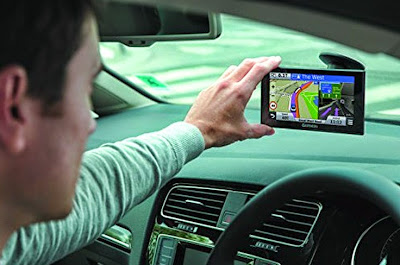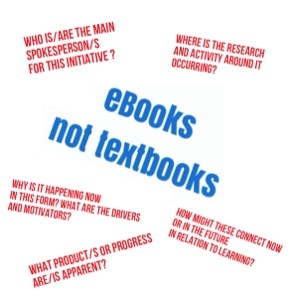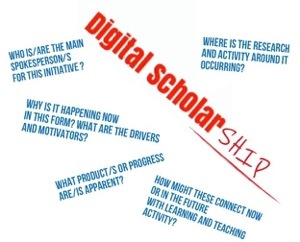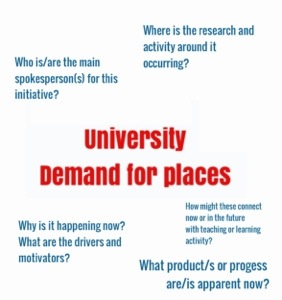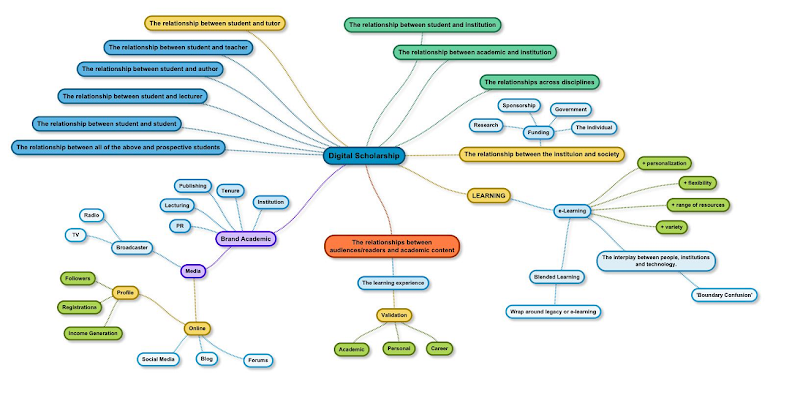The Digital Scholar Martin Weller
Chapter 10
Network Weather
Adam Greenfield (2010) Networked Weather
He talks of Foursquare and a night out, Weller talks of the academic conference.
· Knowledge sharing
· Validation
· Networking
· Recognition
· Socialising
· Remote participation
· Twitter backchannel
· Amplified events
· Socialisation
Twitter hashtags
Blogging
Live blogging
Video
Flickr
Cloudworks and Friendfeed
50% networking
75% content
In 25% of the time
75% greener
Participants not an audience
Backchannel adds another layer, but can be a negative experience for the speaker (Boyd, 2009)
Amplification of the conference
Archive of multimedia, range of tone.
Preservation and curation of such a record
Brian Kelly (2008)
Amplification of:
· Audience's voice
· Speaker's talk
· Across time
· Of slides
· Of feedback
· Collective memory of the event
· Of the learning
· Of the long term conference outputs
Experimentation with:
· Micro-presentations
· Nan-presentations
· Random selection of speakers
· Backchannel
Used to be a choice of attending or not, now there are many alternatives (JV least attending more than one conference at the same time).
2010 Martin Weller ran Openness in Education over two days using Elluminate and Cloudworks.
Four sessions all recorded and made available through Cloudworks.
Sessions chinned and released as podcasts
Also used:
· Twitter
· SurveyMonkey
· Blogs
· YouTube
· slideShare
· Animoto
· Xtranormal
· Pre conference
· And video before and during
Speakers, including Jimmy Wales of Wikipedia.
287 attended synchronous Elluminate sessions
3,500 viewed in CloudWorks
From 14 countries
48% would not have attended in person
Cost 2,500 rather than 30,000
They have a legitimacy deficit to some.
· Attendees not given time from the workplace to attend virtually and readily interrupted.
· Doesn't command as much attention
· Don't plan ahead, so may drop out.
· Technical problems on the day are too late to resolve.
'The Camelot comparison - accentuating the positives of the entrenched practice'.
Hard to compare as they do things differently (and can be blended)
Chapter 11 Reward and Tenure
If it isn't recognised then it isn't recognised when it comes to getting promotion.
Research (more equal than the others)
Teaching
Service or management
Contribution to society
Academic esteem
A conservative value and reward system
'Assessing quality in a reliable and transparent manner is a significant problem in the recognition of digital scholarship, and its intangibility and complexity are enough to make many give up and fall back on the practices they know and trust.
· Recreating the existing model
· Finding digital equivalents
· Generating guidelines that include digital scholarship
· Using metrics (500 views, 4 embeds and a keynote too simplistic)
· Peer review
· Micro-credit
· Developing alternative methods
Keynote speech and reputation
Metrics can be cheated (Hirsh 2005) and gamed (Ealagas and Alexiou 2008)
REF Research Excellence Framework
'A digital scholar is likely to have a distributed online identity, all of which can be seen to represent factors such as reputation, impact, influence and productivity'.
'We continually make the error of subjugating technology to our present practice rather than allowing it to free us from the tyranny of past mistakes'. Stephen Heppell (2001)
'Many if the characteristics which would be frowned upon in scholarly articles, such as subjectivity, humour, and personal opinion, are vital elements in developing a dialogue in blogs'.
· Towards the portfolio approach:
· A range of digital outputs demonstrating impact
· Commendations from the community
· Recognised experts
· Overarching narrative making the case for the work as a whole.
· Peer review = reliability and authority.
· Which could also strangle innovation. (Fitzpatrick 2009)
Chapter 12 Publishing
· Research
· Authoring
· Submission
· Rejection/modification
· Publication
· Dissemination
WHY?
· Accepted practice
· Academic respectability
· Reward and tenure
· Dissemination
· Curation
NB Bellow's Law
'Once the journal has been liberated from the printed format, a number of related assumptions begin to unravel and lead to more fundamental questions.'
22,000 peer reviewed journals from 9,900 publishers.
Questioning the scholarly communication process ... Often the current model does not stand up to scrutiny.
The trucker's deal Wiley 2009b
McGuigan and Russell (2008) Deutsche Bank on how 7,000 people in academic publishing add value to justify 40% margins - they don't.
Advantages of open access publishing Harnad (2005)
· Early advantage
· Arxiv advantage
· Quality bias
· Quality advantage
· Competitive advantage
· Usage advantage
Weller's POV
· Citation advantage
· Time lag to publication
· Copyright
· Alternative publishing methods
Desire for greatest impact and widest dissemination (without compromising its quality or findings).
VS. Time to publication due to peer review and a print mentality that restricts number of items in a journal and how often it is published.
Creative commons keeps rights with the author.
Alternative methods for communication, publishing and debate which are more rewarding.
The traditional article begins to seem remote and dry in comparison.
Google knol web-based authoring.
PLoS hubs
New forms of representation and communication.
Shift from filtering on the way into filtering on the way out. Weinberger (2007)
As they are the product of public funding they should be out there.
We're at a transition state, and Weller gives in ten years for the change to occur. I see it differently as one of the early aeronauts looking out across at English Channel wanting to cross as soon as the weather permits knowing that I may just make it, wait ten years and others will be looking to cross the Atlantic.
Ware (2008) reasons to peer review (for free)
· To play your part as a member of the academic community
· To enjoy being able to improve the paper
· To enjoy seeing Newquay work ahead of publication
· To reciprocate the benefit when others review your postings.
Towards the 'approbation of discerning readers'. Martin Rees (2010)
Chapter 13
Skimming and skipping about instead of deep reading. Easily distracted, or persuasively detracted. But the overall tenure will be rearing to you hear the narrative.
· British Library Google Generation study (Rowlands et al. 2008)
· Has the need to learn by rote diminished?
· Outsourcing mundane memory to Google.
· Skittish bouncing behaviour Wijekumar et al. (2006)
· Web 2.0 and the 'mass democratisation of expression'.
NB 'low quality individual items because of their obvious ease of production, can be seen as an invitation to participate'. Weller
'If the intention is to encourage engagement then low-quality routes may be more fruitful than seeking to produce professional broadcast material'. Weller
'Amateurs' often create content which addresses subjects that academics may nit and also in a manner which differs from traditional teaching', Weller
A facial truism.. Any time you learn anything your brain is 'rewired' at a synaptic level. VS. The pronouncements of the likes of Carr and Greenfield.
Vague and ill-founded arguments.
Plasticity is as true of playing a computer game, or from my experience, coaching swimmers. Adaptation is desirable, ditto for touch-typing, drawing, sight reading when playing a musical instrument even driving a car.
... Based on supposition and anecdote.
'The Internet hasn't changed the way we think any more than the microwave oven has changed the way we digest food'. Joshua Greene.
Also see Gerschenfeld (2010)
... VS pseudo-scientific explanations to back up prejudices will not help us address the issues. Weller
CF Delete: The Virtue of Forgetting in the Digital Age. Mayer-Schonberger (2009)
Idea of giving internet content a shelf-life. I disagree. Once rain water flows from a river into the ocean it is there, for potentially consigned to the depths, for ever.
Bug successes, something going viral, is not the norm.
For success, choice of tools and their perceived relevance to the main area of study are crucial elements. See Cann and Badge (2010).
VS. Creepy tree house syndrome (Stein 2008)
VS an LMS that is 'organisationally controlled, bland and singular in focus'.
NB how to do it? 'By making mistakes' with each iteration generating an improvement (Hilbert space et al. 2000/2001)
Experience is required to understand what approaches are suitable.
It also requires a reasonable mass of contributions to work, a motivation for those contributions and an easy means to contribute.
Just as with the initial dot.com. Hubble, the fact that there is hype doesn't mean the overall direction isn't correct. A technology may not completely change the world in the next 18 months, but it may significantly change practice in the next decade'. Weller (2001)
Roy Amara: we tend to overestimate the effect of a technology in the short run and underestimate the effect in the long run. In Weller (2011)
It will never go back to the way it was.
The people best placed to understand it and adapt to it will be those who have immersed themselves in the current technological climate.
A willingness to experiment with new approaches and to explore the tensions between new possibilities and established practice is essential. Weller 2011
Chapter 14 Digital Resilience
Current scholars - anxieties, scepticism and resistance should be replaced with engagement and reflection.
Just as Clay Shirky looks at 20 years ahead.
QWERTY has been too entrenched to over through.
When distribution becomes abundant, rather than scare, open and shared rather than rivalrous, 'whole industries begin to look weak'.
We are learning what role those new tools play in our lives, and there will inevitably be mistakes, misapplication, overuse and correction'. Weller (2011)
CF Kahneman and Tversky's prospect theory (1979) and our feelings about loss and gain.
The world my daughter will inhabit ...
Rather grand-parents and great-grandparents with cars, planes, cinema, radio and TV and for someone born in 1896 who died in 1993 two world wars, the atomic bomb, men on the moon, the Pill, higher education for all, loss of Empire and a video player that allowed him to see his favourite films from Charlie Chaplin to 'All Quiet on the Western Front'.
'This is a period of transition for scholarship, as significant as any other in its history, from the founding of universities to the establishment of peer review and the scientific method. It is also a period that holds tension and even some paradoxes: it is both business as usual and yet a time for considerable change; individual scholars are being highly innovative and yet the overall picture is one of reluctance; technology is creating new opportunities while simultaneously generating new concerns and problems'. Weller (2011)
Research, Application, Integration and Teaching to Engagement, Experimentation, Reflection and Sharing
If Boyer's four main scholarly functions were research, application, integration and teaching, then I would propose that those of the digital scholar are engagement, experimentation, reflection and sharing'. Weller (2011).

